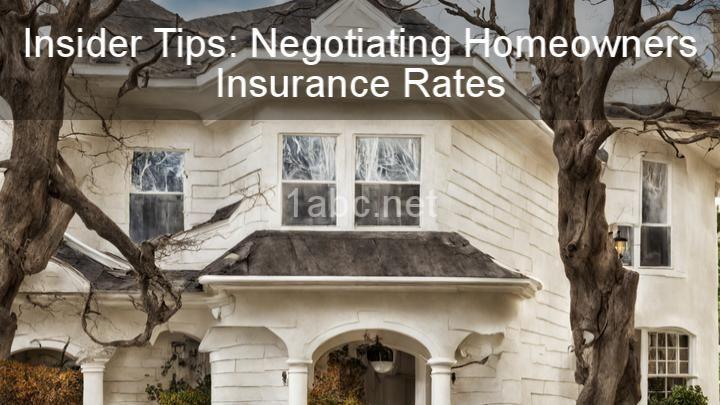Insider Tips: Negotiating Homeowners Insurance Rates

Welcome readers to your ultimate guide for negotiating homeowners insurance rates. In this comprehensive blog post, we will provide you with insider tips and strategies to help you find an affordable homeowners insurance policy without compromising coverage. We understand that homeowners insurance is an essential part of protecting your investment and providing peace of mind. However, we also recognize the importance of finding a policy that fits your budget. With these insider tips, you'll be equipped with the knowledge and tools to negotiate better rates and secure a more affordable insurance policy.
Part I: Understand Your Policy and Coverage Options
Before diving into the negotiation process, it's crucial to have a clear understanding of different types of homeowners insurance policies available in your area. Researching and familiarizing yourself with the options will empower you to make informed decisions. Common coverage options include dwelling coverage, personal property coverage, liability coverage, and additional living expenses coverage. Each of these coverage options has an impact on your premiums and deductible amounts.
Dwelling coverage, for example, is the protection for the structure of your home. The higher the dwelling coverage limit, the higher the premium. Personal property coverage, on the other hand, covers your belongings inside the home. Make sure to evaluate the value of your personal belongings accurately to ensure you have adequate coverage. Liability coverage protects you if someone is injured on your property and sues you for damages. Understanding how these coverage options affect your premiums will help you navigate negotiations more effectively.
Part II: Assess Your Needs and Risks
To negotiate better homeowners insurance rates, it's essential to assess your specific needs and risks. Factors such as location, home value, and personal belongings play a significant role in determining insurance rates. Start by evaluating your home's location and any risk factors associated with it. For instance, if you live in an area prone to natural disasters such as hurricanes or wildfires, you may face higher insurance premiums. Similarly, if your neighborhood has a high crime rate, insurance rates may be affected.
To potentially lower your premiums, consider taking steps to mitigate these risks. Installing security systems, smoke detectors, and other safety features can make your home less prone to accidents or theft. Moreover, making improvements to your home's structure, such as reinforcing the roof or updating electrical systems, can reduce the risk of damage and potentially lead to lower insurance rates. By assessing your needs and risks, you can present yourself as a responsible homeowner to insurance providers, which may work in your favor during negotiations.
Part III: Shop Around for Multiple Quotes
One of the most crucial steps in negotiating homeowners insurance rates is to shop around for multiple quotes. Don't settle for the first quote you receive. Insurance rates can vary significantly from one provider to another, so it's important to compare and contrast multiple options. Start by gathering quotes from different insurance providers and comparing them effectively.
When comparing quotes, consider coverage limits, deductibles, and any additional endorsements or riders offered by each provider. Remember that a lower premium might not always mean better coverage, so it's crucial to strike a balance between affordability and adequate protection. Additionally, take the time to read customer reviews and assess the insurer's reputation for customer service and claims handling. This step will help you identify providers that offer competitive rates without compromising on customer satisfaction.
Consider reaching out to local independent agents who can provide personalized advice and options. These agents work with multiple insurance providers and can offer unbiased recommendations based on your specific needs. Their expertise can be invaluable in helping you navigate through the complexities of homeowners insurance and negotiate better rates.
Part IV: Leverage Discounts and Bundling
Insurance providers offer various discounts that can significantly reduce your homeowners insurance premiums. Familiarize yourself with the available discounts and inquire about them when obtaining quotes. Common discounts include security system discounts, smoke detector discounts, and discounts for bundling home and auto insurance policies with the same provider.
Installing security systems such as alarm systems, surveillance cameras, or deadbolt locks can qualify you for discounts. Similarly, having smoke detectors and fire extinguishers in your home can lead to lower premiums. Bundling your homeowners insurance with your auto insurance policy with the same provider can also result in substantial savings. These discounts can add up, so it's essential to ask about them and take advantage of every opportunity to lower your premiums.
Additionally, inquire about loyalty programs or any other special offers from insurers. Some providers offer discounts or rewards for long-term customers or for those who have a clean claims history. Taking advantage of these loyalty programs can help you negotiate better rates and potentially save even more on your homeowners insurance.
Part V: Review Your Policy Periodically
Negotiating homeowners insurance rates is not a one-time event; it requires periodic review and adjustment. Regularly reviewing your policy ensures that you're still receiving competitive rates and that your coverage adequately protects your investment. Life changes and home improvements can impact your insurance needs, so it's essential to stay proactive.
Life changes such as getting married, having children, or retiring can influence your insurance needs. Adjusting your coverage limits or adding additional endorsements may be necessary to ensure adequate protection. Similarly, home improvements such as renovations or additions can increase the value of your home, requiring adjustments to your coverage. By periodically reviewing your policy and staying up to date with your insurance needs, you can negotiate better rates during policy renewals.
Before negotiating your rates during policy renewals, conduct market research to understand current insurance trends and rates in your area. This knowledge will give you a strong negotiating position and help you justify your request for lower rates. If you've made significant home improvements or implemented additional safety measures, highlight these changes to your insurance provider to demonstrate your commitment to risk mitigation.
In conclusion, negotiating homeowners insurance rates is possible with the right knowledge and approach. By understanding your policy and coverage options, assessing your needs and risks, shopping around for multiple quotes, leveraging discounts and bundling, and reviewing your policy periodically, you can secure a more affordable insurance policy without compromising coverage. Remember, homeowners insurance is a critical aspect of protecting your investment and providing peace of mind. Take action and start implementing these insider tips to find the best homeowners insurance rates for your needs.
FREQUENTLY ASKED QUESTIONS
What is homeowners insurance?
Homeowners insurance is a type of insurance policy that provides coverage for homeowners in the event of property damage, theft, liability, or personal injury on their property. It typically includes coverage for the dwelling itself, as well as other structures on the property such as a garage or shed. Homeowners insurance also covers personal belongings, additional living expenses in case of a temporary displacement, and liability protection in case someone gets injured on the homeowner's property. The specific coverage and limits offered can vary depending on the policy and insurance provider. It is important for homeowners to carefully review their policy to understand what is covered and any exclusions or limitations.
How does homeowners insurance protect my property?
Homeowners insurance is designed to protect your property in several ways:
- Dwelling Coverage: This type of coverage helps protect the structure of your home if it is damaged or destroyed by covered perils such as fire, lightning, hail, or vandalism. It typically includes the main building, as well as attached structures like garages or decks.
- Other Structures Coverage: This coverage extends to other structures on your property, such as detached garages, sheds, or fences. It helps cover the cost of repairing or rebuilding these structures if they are damaged or destroyed by covered perils.
- Personal Property Coverage: This coverage protects your personal belongings, such as furniture, electronics, appliances, and clothing, against covered perils. If your personal property is damaged, stolen, or destroyed, homeowners insurance can help cover the cost of replacing or repairing the items up to your policy's limits.
- Liability Coverage: Homeowners insurance also provides liability protection. If someone is injured on your property or if you accidentally damage someone else's property, liability coverage can help cover legal expenses, medical bills, and other costs associated with a liability claim.
- Additional Living Expenses: If your home becomes uninhabitable due to a covered peril, homeowners insurance can cover the additional costs you incur for temporary accommodations, such as hotel bills or rental expenses, until your home is repaired or rebuilt.
It's important to review your policy to understand the specific coverage and limits provided by your homeowners insurance.
Why is it important to negotiate homeowners insurance rates?
Negotiating homeowners insurance rates is important for several reasons:
- Cost savings: By negotiating lower insurance rates, homeowners can save money on their premium payments. This can result in significant long-term savings, especially considering that home insurance is typically a long-term commitment.
- Customized coverage: Negotiating rates allows homeowners to tailor their insurance coverage to their specific needs. This ensures that they don't pay for unnecessary coverage and only pay for what is essential for their property and personal belongings.
- Competitive advantage: By comparing and negotiating rates from multiple insurance providers, homeowners can find the most competitive offers in the market. This not only helps them secure the best coverage but also gives them leverage to negotiate better terms and conditions.
- Risk management: By negotiating homeowners insurance rates, homeowners can ensure that they have adequate coverage to protect their property and belongings in the event of unfortunate incidents like theft, fire, or natural disasters. This ultimately helps them manage their risks effectively.
Overall, negotiating homeowners insurance rates is crucial as it empowers homeowners to save money, customize coverage, gain a competitive edge, and mitigate potential risks.
What factors affect homeowners insurance rates?
Several factors can affect homeowners insurance rates. These can include:
- Location: The location of your home is a significant factor in determining the insurance premium. Insurance companies consider the proximity to natural disasters, such as hurricanes, floods, or earthquakes, and the crime rate in the area.
- Home characteristics: The age, size, and construction materials of your home can also influence the insurance rates. Newer homes or those built with fire-resistant materials may have lower premiums compared to older homes or those constructed with flammable materials.
- Coverage amount: The amount of coverage you choose for your home and belongings will impact the insurance rates. Higher coverage limits will result in higher premiums.
- Deductible: The deductible is the amount you are responsible for paying before the insurance coverage kicks in. Opting for a higher deductible can lower your premiums, but keep in mind that you'll have to pay more out of pocket if you file a claim.
- Claims history: If you have a history of filing frequent insurance claims, it may lead to higher premiums, as insurance companies consider you to be a higher risk.
- Credit score: In some states, insurers may assess your credit score and use it as a factor in determining your premiums. A lower credit score could lead to higher insurance rates.
- Fire protection: The proximity of your home to a fire station and the availability of fire hydrants can influence your insurance rates. Homes in closer proximity to fire protection often have lower premiums.
- Security features: Having security systems, smoke detectors, deadbolts, or other security measures in place may entitle you to discounts on your insurance premium.
It's essential to consider these factors when looking for homeowners insurance coverage to get an understanding of the potential costs. Contacting insurance providers and comparing quotes can help you find the best rate for your specific circumstances.
